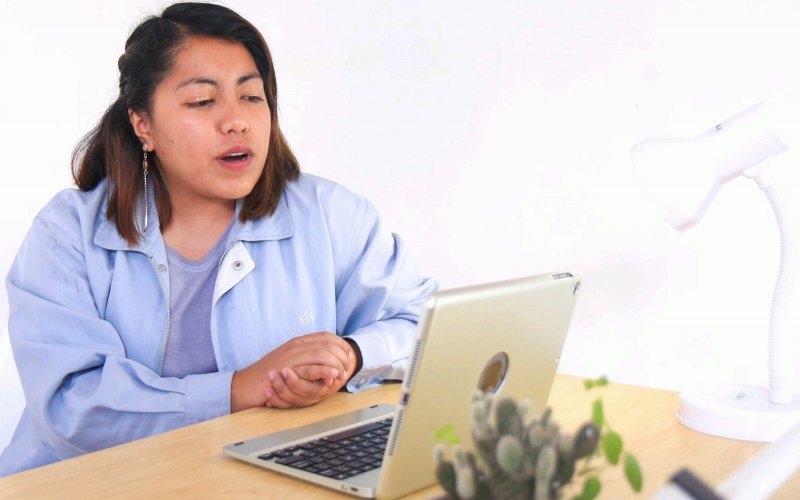Beyond the Script: Theatre Program Partners with SSW Students to Simulate Field Training

ALBANY, N.Y. (May 20, 2021) — “Hi, my name is Jo…”
That was the first line all of the UAlbany Theatre Program alumni and students used when they met virtually with social work first-year graduate students from the School of Social Welfare (SSW) for client simulations.
The field practicum is a major part of the Master of Social Work (MSW) academic curriculum, where students gain valuable real-life experience working with clients in community-based agencies. In a year marked by a global pandemic, however, adjustments had to be made in how these students would be trained.
“Because of the pandemic, many agencies were not able to provide the usual learning opportunities for our students,” said the SSW’s Field Education Director Lisa DeLaMater. “The crisis required us to create new ways for social work students to integrate social work theory, knowledge, skills and values. Together with the Theatre Program, we were able to provide simulations that replicate the experiences and learning that social work students would receive in an in-person field practicum.”
The 32 social work students who participated in the simulations were given a case description a few days prior to meeting the “clients.” To prepare for their sessions, the students drew on what they have been learning in classes about case theory and client engagement strategies.
Theatre program alumni and current students were also given the case description. They had sessions with Kim Stauffer, who is the head of acting in UAlbany’s Theatre Program and has a background in social work, standardized patient work and social justice. There, they worked on character development and learned standardized patient practices and protocols so they could fully embody their role.
“I loved the idea that two very different concentrations were working together to learn,” said Samantha Wilson, a junior theatre major. “I found it very beneficial because, for them, they weren’t acting. They were running these simulations as if they were talking to real people going through these very real situations.”
Via Zoom, the social work students participated in three separate simulations during the spring 2021 semester. After each session, the social work students completed assessments and case notes, just as they would in real life. The simulations were recorded and sent to each student’s field instructor for feedback, frame by frame.
“I really enjoyed teaming up with the Theatre Program because it allowed for the situations to be customized in terms of difficult cases,” said Mike McLoughlin, a first-year MSW student. “I now have less jitters going into client sessions.”
Nine alumni actors, who spanned multiple countries and time zones, participated in the standardized patient simulation training and resume-building experience, while 11 current theater students used this simulation as a class project.
"Things like learning to follow our intuition, staying present, listening and improvising in the midst of an uncomfortable or anxiety producing exchange — these are things we can only learn by doing. Both actors and social workers must possess and hone these skills, so it made perfect sense to bring them together for this type of experience,” said Stauffer.
The partnership was so successful that there are plans to continue it, even when MSW students return to in-person field studies.
“The main benefit to simulation and social work practice is that the social work student gets to assume their professional role and then apply social work practice skills to a client without any risk of potential harm to the client,” DeLaMater said. The students gain valuable skills in building rapport, crisis intervention and de-escalation while in a safe space, while the theater alumni and students practice valuable skills of expression and storytelling for their own craft.
Stauffer called the partnership a natural fit. “Standardized Patient Training is a skill many actors use to get work after they graduate, so adding this to our curriculum was right in line with our learning objectives,” she said. “We have been collaborating with the School of Social Welfare in various capacities over the years and are grateful for the opportunity to make it official.”
“I thought it was such an interesting concept to see that even though our disciplines were entirely different, we are all working to achieve the same thing: to make the world a better place,” said Wilson.




